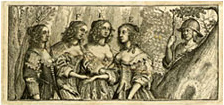Alexander Richardson, The Logician's Schoolmaster (1629)
Full Text
Not available
EEBO/TCP
Not available
Date
1629
Author
Alexander Richardson Note: 13/10/2005
Book title
The Logicians School-Master: Or, A Comment Vpon Ramvs Logicke
Publication place
London
Publisher
John Bellamie
Text type
printed book
Genre
Hard-word, term-of-art, and dialect dictionaries, glossaries, and definitions
Subject area
logic
Summary
Defining explanations are sprinkled throughout the prose treatise
Word-group
type: undifferentiated
Word-entry
type: logical
sample: Forma est causa.
μορφη is the same that forma is in Latine, there is but a transposition of the letters, and μορφη properly signifies the face; and fas and facies in Latine comes of facio, because when it is made it hath the face of a thing: so a thing when it hath its forme, it hath a face, it will seeme something: so that the efficients esse is not facies rei, nor the matters esse, for they might be otherwhere, ergo the efficient and matter are common causes: this is a particular one, which is one reason why the efficient and matter goe before, being more generall: so that when once he hath the face of a man, then is he a man; this word forma both in Latine and Greeke is taken abusiue for the outward figure of a thing; it is a metonimy of the subiect for the adiunct; for figuration is not forma ... (p. 99)
sample: Forma est causa.
μορφη is the same that forma is in Latine, there is but a transposition of the letters, and μορφη properly signifies the face; and fas and facies in Latine comes of facio, because when it is made it hath the face of a thing: so a thing when it hath its forme, it hath a face, it will seeme something: so that the efficients esse is not facies rei, nor the matters esse, for they might be otherwhere, ergo the efficient and matter are common causes: this is a particular one, which is one reason why the efficient and matter goe before, being more generall: so that when once he hath the face of a man, then is he a man; this word forma both in Latine and Greeke is taken abusiue for the outward figure of a thing; it is a metonimy of the subiect for the adiunct; for figuration is not forma ... (p. 99)
Alston
VII.42
STC
21012
Other editions
1657: Wing R1378 (Alston VII.43)




